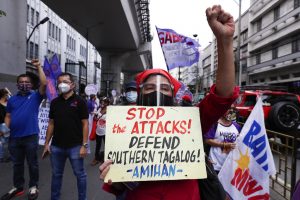Over the weekend, Philippine police backed by military units killed nine people in a series of raids against suspected communist insurgents in the southern part of Luzon island.
Philippines authorities conducted separate raids in the provinces of Cavite, Laguna, Batangas, and Rizal, while serving at least 24 search warrants, mostly for illegal firearms and explosives.
Police have since claimed that all of those killed were associated with “communist terrorist groups” and had shot at officers while being served search warrants, and that another six other suspects were arrested and nine escaped. However, activist groups including the rights organizations Karapatan and Altermidya, said those killed were mostly unarmed labor organizers and left-wing activists.
Indeed, it is hard to give the police the benefit of the doubt given that they have offered the same pretext in the cases of the thousands of people shot dead during President Rodrigo Duterte’s bloody “war on drugs” since 2016.
As usual, Duterte appeared to give the game away late last week, when he gave a speech in Cagayan de Oro in which he described communist New People’s Army (NPA) as “bandits” and ordered the police to be merciless in rooting them out.
“If there’s an encounter and you see them armed, kill, kill them, don’t mind human rights, I will be the one to go to prison, I don’t have qualms,” Duterte said.
Communist insurgencies have roiled the Philippines since before its independence, feeding on the island nation’s massively skewed economic inequalities and feudal patterns of land distribution. The current insurgency, which is led by the NPA, the armed wing of the Communist Party of the Philippines (CPP), dates back to 1969, and despite constant counterinsurgency operations, has managed to survive and expand in the rugged interior of Luzon and other islands.
On coming to office, Duterte promised to end the nearly half-century-long insurgency, and seemed uniquely well placed to do so, given his close personal connections to left-wing political groups. (Indeed, he once studied under Jose Maria Sison, the founder of the CPP.)
However, as peace negotiations frayed into renewed conflict, Duterte has adopted the same ultra-violent, take-no-prisoners approach that he has taken in his fight against illegal drugs. Both the Armed Forces of the Philippines (AFP) and the government have claimed that the NPA is on the verge of collapse and can be finally defeated by the end of Duterte’s presidential term in 2022.
The tough approach to the rebels has been accompanied by the sinister phenomenon of “red-tagging,” whereby opponents of Duterte’s administration are labeled communists or terrorists by government supporters or state officials, nearly always without proof, exposing them to potentially deadly violence.
Human Rights Watch described the weekend’s raids as part of a “coordinated plan by the authorities to raid, arrest, and even kill activists in their homes and offices.”
“This campaign no longer makes any distinction between armed rebels and noncombatant activists, labor leaders, and rights defenders,” the group added in an emailed statement. “It is not a coincidence that these deadly raids happened two days after President Rodrigo Duterte ordered police and military to ‘kill all’ communists.”
As Jack Broome noted recently in a feature article for The Diplomat, Duterte’s promise of defeating the NPA insurgency by next year is very unlikely to succeed. Alongside the difficulty of rooting out the insurgency itself is the fact that many key actors benefit from a continuation of the conflict. The communist threat provides a useful political bogeyman that the Duterte administration can use to tackle opposition and legitimize some of its more controversial policies, while offering the AFP a pretext for demanding inflated military budgets. Meanwhile, villages and local government offices benefit from central government demobilization and development handouts designed to turn local populations away from the insurgency.
In this context, the violent actions of the police and military seem almost designed to ensure that the discontent that fuels anti-communist insurgency for more than five decades continues.

































